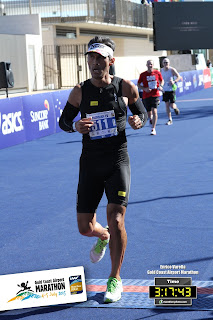With an upcoming running clinic, I would like to share some of my thoughts about how you may qualify for a Boston Qualifier (BQ). Be warned: My approach may not be aligned with yours. Although sound, it is non-conventional, perhaps because of my age and background in multi-discipline, endurance, sports.
The Boston Marathon, is the holy grail for serious marathoners, and it sits parallel with Ironman triathletes for a dream-ticket or podium-slot for the Ironman World Championships in Kailua, Kona. These events and many others in the endurance sports, including ultra-marathons and desert-runs, and Mount Everest represent the zenith in one's training/racing history.
I have earned three BQs, in 2011, 2013, and 2015
I completed my first Boston Marathon in 2014 in 'Boston Strong', and hope to earn another slot amongst the 30,000 on Patriot's Day 2016. My approach for all three BQs were similar and minimalist.
1) I ran, predominantly, on-road: My chosen races were all road-races, thus, I raced specifically, on tar/tarmac.
2) I raced both on-road and off-road/trail (ultra-marathon, 52.5km) to engage different muscles and responses. In my last BQ at Gold Coast Marathon, I integrated off-road sections and some slopes/bridges, which seemed to help me finish strong (although I ran much less).
3) I trained 3-4 days per week, mostly single sessions. Additional aerobic stimulus came from riding indoors or outdoors (2-3 hours per session). My total training mileage per week has been about 40-50km per week.
4) My run training was based, mainly, on one long/two short sessions - all at tempo/time-trial pace. I eliminated 'Junk Miles'. [I subscribe to 'Run Less, Run Faster' philosophy, although I intuitively applied that since 2010 after my biking accident.]
5) My workouts include 2 X 10km, plus one long 21-24km, all done at Tempo or Fartlek (. I did no track intervals, hill-work, and very few group-running. Consistency and discipline is key! A short run is better than no run. However, skip runs if you are feeling unwell, as illness sabotages your training plan.
6) I included one more run/race before my marathon preparation block (12-week). The race could be a 10km, 21km or 32km. A 32km race or run would be done 2-3 weeks before race-day.
7) I cross-trained (cycling and swimming) all-year-round, as required of a triathlete. I race two Ironman triathlons annually since 2006, so that included two in-race, marathons already.
8) I did some strength and conditioning workout, using bodyweight (circuit), kettle-bells, or free-weights. I relearnt my gait, focused on mid-sole (as forefoot running may have led to my first hairline toe fracture in 2012, and a dismal Berlin Marathon timing of 4:00 hours).
9) As racing is a personal event based on tactics and strategy, I raced regularly to accustom myself to race-pace (or faster, over-10km and 21km) and earn my confidence to race uncomfortably (including Zone 4/panting zone).
10) I learnt to eat well, using the 80:20 Rule, focused on more essential fats (including coconut oil, butter, extra-virgin olive oil, and nuts).
The Boston Marathon, is the holy grail for serious marathoners, and it sits parallel with Ironman triathletes for a dream-ticket or podium-slot for the Ironman World Championships in Kailua, Kona. These events and many others in the endurance sports, including ultra-marathons and desert-runs, and Mount Everest represent the zenith in one's training/racing history.
I have earned three BQs, in 2011, 2013, and 2015
I completed my first Boston Marathon in 2014 in 'Boston Strong', and hope to earn another slot amongst the 30,000 on Patriot's Day 2016. My approach for all three BQs were similar and minimalist.
1) I ran, predominantly, on-road: My chosen races were all road-races, thus, I raced specifically, on tar/tarmac.
2) I raced both on-road and off-road/trail (ultra-marathon, 52.5km) to engage different muscles and responses. In my last BQ at Gold Coast Marathon, I integrated off-road sections and some slopes/bridges, which seemed to help me finish strong (although I ran much less).
3) I trained 3-4 days per week, mostly single sessions. Additional aerobic stimulus came from riding indoors or outdoors (2-3 hours per session). My total training mileage per week has been about 40-50km per week.
4) My run training was based, mainly, on one long/two short sessions - all at tempo/time-trial pace. I eliminated 'Junk Miles'. [I subscribe to 'Run Less, Run Faster' philosophy, although I intuitively applied that since 2010 after my biking accident.]
5) My workouts include 2 X 10km, plus one long 21-24km, all done at Tempo or Fartlek (. I did no track intervals, hill-work, and very few group-running. Consistency and discipline is key! A short run is better than no run. However, skip runs if you are feeling unwell, as illness sabotages your training plan.
6) I included one more run/race before my marathon preparation block (12-week). The race could be a 10km, 21km or 32km. A 32km race or run would be done 2-3 weeks before race-day.
7) I cross-trained (cycling and swimming) all-year-round, as required of a triathlete. I race two Ironman triathlons annually since 2006, so that included two in-race, marathons already.
8) I did some strength and conditioning workout, using bodyweight (circuit), kettle-bells, or free-weights. I relearnt my gait, focused on mid-sole (as forefoot running may have led to my first hairline toe fracture in 2012, and a dismal Berlin Marathon timing of 4:00 hours).
9) As racing is a personal event based on tactics and strategy, I raced regularly to accustom myself to race-pace (or faster, over-10km and 21km) and earn my confidence to race uncomfortably (including Zone 4/panting zone).
10) I learnt to eat well, using the 80:20 Rule, focused on more essential fats (including coconut oil, butter, extra-virgin olive oil, and nuts).




No comments:
Post a Comment